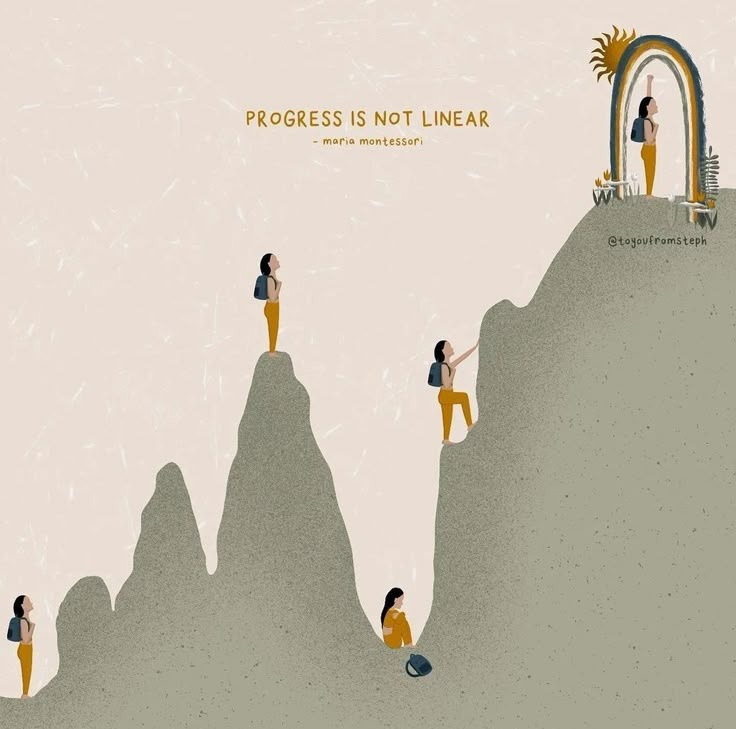something i often find myself doing on substack is clicking on the profiles of people with more subscribers than me. i’ve been doing it… probably since i hit 50 subscribers. if they’ve been on the platform longer than me, i feel better about myself; i tell myself that i can do as well as them if i just keep going. but if they’re newer than i am… i go into an unnecessary slump. i feel jealous that i’ve been posting longer yet they’ve gained more traction. and… this is a very unhealthy mindset as a creator.
i’ve been reflecting on this lately, especially as i near my one-year mark of this publication being up. why am i telling myself that i’m doing worse than them because they’ve gained a bigger audience in a shorter amount of time? why am i unhappy with my own audience even when all those little milestones made me feel so happy? why am i comparing myself to people older than me, people who write differently than me, people on their own unique journeys?
sometimes, the healthy thing to do isn’t to use comparison to push yourself to do better… but to tell yourself that you’re doing great and that your journey is so different than others that it’s not worth a comparison—that’ll just slow you down. sometimes, the best thing to do is pat yourself on the back and continue on at the pace that makes you feel comfortable and happy.
my little comparison thing definitely doesn’t merely apply to substack. i’m sure all of us can relate it to some aspect in our lives in some way, whether that’s judging other people’s taste in clothing or music, their bodies or height, their accomplishments and aspirations, their social statuses. it seems like there’s always someone ahead of you in the race of life, and it sucks to see them—especially if they seemed to start after you did.
another form of stupid comparison i find myself doing often regards one of my sports: swim. every swimmer starts at a different time. each person has their unique strengths, preferences, and styles. i’m not exactly the fastest swimmer, but i’m not really slow either. i’m kinda just average even though i feel like i’ve been swimming for ages. in reality, i only started swim in 2021 (with a gap year in 2022). plenty of swimmers at my level have been swimming a lot longer. but plenty of swimmers at my level or higher have also been swimming for not quite as long. and seeing those people really screws with my head.
the hard part of stuff like this is the conflict between self-affirmation and self-improvement. should i still tell myself, “you’re doing great, just keep going,” or should i strive to be better? should i take their progress and effort and use that to push myself faster?? in things like substack, we acknowledge that that’s a bit of an unhealthy mindset. but in sports, and tons of things in life, improving yourself is crucial or else you’ll fall behind. so where do we draw the line?
why we make comparisons
so why do we compare ourselves to others in the first place? what is the root of feelings like envy and jealousy? well, i think most of us can agree it’s rooted in a desire for happiness or satisfaction. when we feel jealous of others, we find ourselves longing for something that we think will make us feel better.
if i had a body like theirs, i’d feel so much better.
if i had their form, i’d be so much faster/better/stronger.
if i had their mindset, i’d be so much happier.
from all of our comparisons stems a longing for mental peace—a longing for something that, if we could have or do, would make us so much happier or feel better about ourselves.
realizing that can help us discern if it’s better to say, “i’m good enough right now” or “i should strive to be like them”.
balancing your mindset
now, this may be obvious to you guys, i dunno. but for me personally, i’ve found that it’s all about balancing your mindset regarding the comparisons you make. think back to the self-affirmation vs. self-improvement. it’s crucial to keep your mindset positive through self-affirmation. however, we’ve acknowledged through examples like sports that sometimes self-improvement matters too.
but now a few questions arise: 1) how does one balance one’s mindset? 2) why should we? why can’t we just stick to one or the other?
we’ll come back to the first question, but let’s first illustrate the answer to the second through…
TOXIC SELF-AFFIRMATION
while it’s important to view ourselves with a positive outlook, relying solely on self-affirmation poses a few threats.
let’s go back to the swim example for a second. if i compared myself to all the other swimmers but told myself, “it’s okay. i’m trying my best and that’s what matters.” while that isn’t inherently unhealthy, we’ve acknowledged that it can become problematic since we’ll likely fall behind if we don’t strive to improve.
but there’s also the threat of…
TOXIC SELF-IMPROVEMENT
is it inherently unhealthy to compare myself to faster swimmers and use that as motivation to improve? not really.
can it be, though? definitely.
that’s why balancing our mindsets is so important. we shouldn’t be focusing so hard on self-improvement that it turns into something toxic. sure, i can strive to be better than those swimmers. but how does that shift my view of those swimmers? self-improvement can be a great thing… until it turns into something negative. “i’m gonna be so much faster than him.” “i’m gonna have such a better job than them.” “i’m gonna make so much more money than her.” if we use comparison and jealousy in that way… it’s not exactly healthy.
being rational with our comparisons
we humans are prone to making some of the most irrational comparisons. take the example i gave at the very beginning of this post: “there are so many people on substack with more subscribers than me. i should try to grow my audience faster.” nothing about that idea is rational, even if i do find a way to balance my mindset. substack isn’t a race to hit milestones the fastest, and having a massive audience isn’t the ultimate goal for everyone.
when we compare ourselves to others, we need to ask: does this actually matter? should I even be making this comparison? for some things like substack, the answer seems clear. for things like sports… it’s a bit more complicated.
we also need to recognize our limits. i can look at elite swimmers’ times and push myself to drop five seconds on my 50-yard freestyle. that’s a great goal…but also unrealistic given my current state. comparing myself to swimmers years older than me doesn’t really make sense.
when harnessing comparison as motivation to improve, we have to make sure it’s rational. are we in a position to reach the level of the people we’re comparing ourselves to? or are we setting ourselves up for frustration? keeping that in mind can help us focus on what actually matters.
the emotional toll of constant self-comparison
so, we’ve recognized that comparison can be an amazing thing. if we’re rational with it and find a way to keep our mindsets from being toxic, we can ultimately develop a healthy drive to keep improving. however, there are a few cons to harnessing comparison for the sake of this drive.
continuously relying on comparison for passion can lead to burnout, anxiety, and even imposter syndrome—the feeling that no matter how much we accomplish, we’ll never quite measure up, and that even when we do accomplish things, we don’t deserve it.
i’ve definitely experienced this before. the mental exhaustion of always feeling “not enough” creeps in every time i catch myself obsessing over other writers’ growth or swimmers’ times. no matter how much progress i make, there seems to always be someone ahead of me… but that’s just the reality of life. yes, people are ahead of you, but who cares? we shouldn’t be letting the progress of others downplay our own journeys, even if it seems impossible to not feel jealous.
at a certain point, we have to recognize when comparison stops being motivating and starts being harmful. like i said at the beginning, sometimes taking a step back is the healthiest thing we can do.
learning to feel inspired rather than envious
one of the biggest mindset shifts i’ve been working on is turning my jealousy into admiration. instead of asking, “why them?” i ask, “what can i learn from them?”
if someone has grown faster than me on substack, maybe they’ve found a better way to engage their audience. if another swimmer has improved more quickly, maybe their training approach is different from mine. instead of seeing others’ success as a threat, we can study what they’re doing right and apply it in a way that works for us.
now, this shift isn’t easy. jealousy is an instinct, it’s a part of human nature. but learning to reframe it into something productive—something that fuels growth rather than insecurity—can make all the difference.
the role of patience in growth
improvement takes time. we live in a world obsessed with instant success, but real progress isn’t often linear. rushing to improve at an unsustainable pace often leads to burnout or discouragement.
in sports, pushing too hard can lead to injury. on substack, constantly chasing growth can turn writing into a chore. in both cases, the obsession with rapid progress can ruin the very thing we once enjoyed.
patience is underrated. trusting the process and focusing on consistency over time rather than immediate results is what really leads to lasting success.
the value of looking back, not just ahead
one of the best ways to combat unhealthy comparisons is to shift our focus inward. rather than constantly measuring ourselves against others, we can compare ourselves to who we were yesterday, last month, or last year.
though i’m not the best swimmer, thinking back to where i was in 2021, i’ve come such a long way. and on substack, i remember how excited i was when i hit 50 subscribers. i was so much happier when i just focused on my progress. the more i compared myself to others, the more i let those milestones lose their meaning.
looking back reminds us of how much progress we’ve already made. it helps us appreciate our own journey instead of fixating on the next milestone. it helps us realize that the only person we should be using for motivation is ourselves.
finding the balance
so… we’re back to self-affirmation vs. self-improvement. should we use comparison as motivation to improve or should we remind ourselves that we’re doing fine as we are? just like before, it’s all about balance—balancing our mindset, our methods, our outlook, our feelings… taking everything and finding a way to turn it into something healthy and beneficial.
the key is knowing when to push yourself and when to take a step back. some comparisons are useful, but not all of them. if a comparison motivates you in a healthy way, great. if it just makes you feel like you’ll never measure up, maybe it’s time to let it go.
at the end of the day, our journeys are ours alone. none of us are behind. we’re exactly where we’re supposed to be, and we’re all doing great.
i haven’t written a post like this in a long while. that’s partially because i’m terrible at explaining things (which is why this isn’t an advice blog). lately, i’ve been feeling such pressure to improve. substack, sports, status, my social life… everything seems to be a race. but i’ve finally started to recognize that in actuality, none of it is. i dunno if all of you already knew that and if it’s just me, but if you didn’t, i hope this post helped you out.
whether this post pitched an idea you hadn’t thought of or served as a little reminder, i hope you enjoyed it. let me know if you want to read more stuff like this or if you’re desperate for a life post (since that is the main point of this publication…).
as always, thank you all for being here and supporting my work. i wish you all a wonderful day, and i’ll see you in my next post. much love <3











not me looking at your profile doing this exact thing the other day, "i remember when he had less subs than me." 💀🤣 thanks for sharing, man!
beautiful post